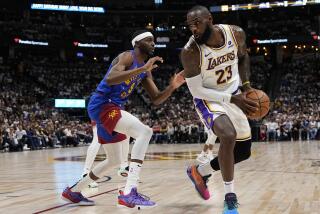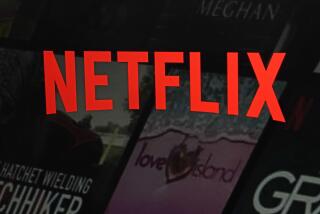NBC: Your ad here
Here’s an example of the great and seemingly growing divide between people who write about TV and the executives who make it.
You may recall that earlier this month, NBC foisted upon us a made-for-TV “Knight Rider” movie, based on the ‘80s crime-fighter series that starred David Hasselhoff. Reviewers were impressed by neither the movie nor the muscled-up Mustang that the hero zoomed around in. Los Angeles Times critic Mary McNamara described the program as a “two-hour (!) movie/pilot/extended Ford commercial.”
To which NBC execs might say: Mmm, yes. Where’s the problem here?
The network made no secret of its marketing deal with the car company, and after the show aired, it trumpeted the show’s ratings, which put it No. 5 for the week among young adult viewers (albeit among strike-dampened competition). “Knight Rider” is almost certain to return as a series next season.
Strange noises come out of NBC offices these days. The network drew ridicule from both competitors and some journalists when it pounded the drums last week for a supposedly new “client-centric” approach to selling commercial time to advertisers. A news release carried on about how the network was taking the “unprecedented step of unveiling a full, 52-week prime-time programming schedule in early April,” or roughly six weeks earlier than usual.
Trouble is, the step isn’t unprecedented. Fox announced essentially the same strategy more than four years ago, with its then-president Gail Berman saying, “We are 12-month-a-year programmers.”
So naturally, rivals’ reaction to NBC’s announcement landed somewhere between bemusement and bitterness. “They’re not saying anything new,” Fox Executive Vice President Preston Beckman told me (and not just me: Fox appeared eager to get Beckman, a former top NBC executive, on the horn with as many journos as possible). The new approach is just a way of papering over NBC’s programming woes, he added: “They’ve had so much failure, they have all these holes on their schedule.”
Let us submit right now that NBC’s announcement that it was reforming the industry did not amount to a genius public-relations coup for a broadcaster that has spent much of the last few seasons in the ratings cellar. But looking past the PR maneuvers, one can see that NBC’s decision-making does give viewers some vital clues about where the network television business is headed, the types of programming likely to show up on TV screens in coming years and -- maybe most important -- how that content will be paid for. NBC Entertainment co-Chairman Marc Graboff illuminated some of NBC’s thinking on those points during our follow-up talk.
Anyone who follows the media business knows that advertising has become a shaky foundation for just about every format, be it newspapers, magazines or television (the desire to get away from the volatile ad market was the stated reason behind Reed Elsevier’s decision last week to put its business magazines, including Variety, on the block). Even the promises for online ads look overblown.
And yet NBC is casting its fate mainly with advertising -- as opposed to, say, subscriptions, on-demand, online, DVDs or any other alternative revenue stream you might think of.
So that means TV execs are going to have to get a lot more creative about how they snag ad dollars. And it means that advertisers are going to have a lot more of a say about what goes over the airwaves on “free” TV.
Hence . . . a prime-time Ford infomercial, a.k.a. “Knight Rider.”
Graboff and his co-chairman, Ben Silverman, will spend three days this spring meeting with big advertisers and going over programming plans for the coming year. This will happen weeks before the traditional “upfront” ad presentations in May, where networks have traditionally rolled out their fall schedules.
“Instead of us standing up there on the stage, saying, ‘Here’s what we’re going to launch on Monday nights,’ we’ll sit down with influential advertisers and say, ‘Here’s what our schedule will look like for the next 52 weeks. What do you think?’ ” Graboff said. “We’ll walk them through our strategy.”
But haven’t these types of backroom discussions with ad people always been taking place? “You’d be surprised,” he replied. “Not really.”
Graboff cautioned that NBC will only “consider” what advertisers had to say, that Madison Avenue won’t start calling all the programming shots. When asked what changes the average viewer would notice, he paused for a few moments.
“The average viewer of NBC won’t notice anything except our programming will be delivered to them in a more user-friendly way,” he said, adding that a schedule with fewer repeats was among the more “user-friendly” qualities.
But the fact is that any viewer paying attention already has noticed the rapidly rising tide of placements, sponsorships and tie-ins on network TV. Not just on “Knight Rider,” but on “American Gladiators,” “The Biggest Loser,” “Heroes” and many other NBC shows. (Indeed, mad props for ad buyers are breaking out everywhere: Last week on “American Idol,” Simon Cowell not only took a long swig from his big red cup with the Coca-Cola logo, he also remarked, in a seemingly facetious aside, how much he enjoys the soft drink.)
Given that advertisers tend to be (1) extremely risk-averse to any content that might offend someone somewhere and (2) want their products plugged in glowing terms at every available opportunity, you might rationally guess that giving them more programming clout will not yield better shows. (True, sponsorships once yielded classic fare such as “Texaco Star Theatre,” but that was more than half a century ago, when scripted TV shows were in their infancy and ads weren’t nearly as ubiquitous as they are today.)
What got lost in NBC’s clumsy announcement is that it’s right about one thing: A network committed to free TV invariably has to get close to advertisers. There’s no other way to pay the bills. But the question is how a network goes about that task and what sort of programming compromises it’s willing to make.
On that score, it’s possible to argue that NBC has gone too far.
Placements are fine, as long as they don’t scream for attention or interrupt dramatic flow.
You want to stick the Coke logo here, or have Tina Fey do tie-ins with American Express there? As long as the show’s good, no one’s likely to make a big fuss.
But running a two-hour infomercial for Ford during prime time? Even by NBC’s standards, that may be taking this let’s-rescue-the-business thing a little too far.
--
The Channel Island column runs every Monday in Calendar.
Contact Scott Collins at scott.collins@latimes.com
More to Read
The biggest entertainment stories
Get our big stories about Hollywood, film, television, music, arts, culture and more right in your inbox as soon as they publish.
You may occasionally receive promotional content from the Los Angeles Times.











